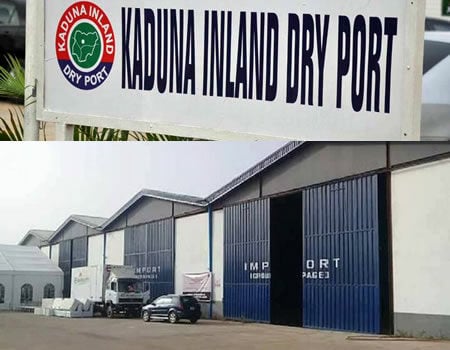Kaduna Dry Port’s Operational Challenges
Le Kaduna Inland Dry Port, a crucial logistics hub in Northern Nigeria, has been significantly underperforming due to halted rail services from Lagos seaports. This disruption stems from ongoing security threats in the region and recent flooding that damaged vital sections of the rail tracks connecting Lagos to Kaduna.
The facility, inaugurated in 2018, was envisioned as a strategic inland cargo handling and clearance center to alleviate pressure on Lagos ports and support trade in Nigeria’s hinterland. However, persistent obstacles have rendered these ambitions difficult to fulfill.
Impact of Security Concerns on Rail Cargo Movement
Rail transport, once the backbone of cargo movement from Apapa Port in Lagos to Northern states, has been suspended because of frequent bandit attacks, particularly in Niger State. These security issues have forced the Nigerian Railway Corporation (NRC) to suspend rail cargo shipments to the Kaduna Dry Port indefinitely.
The lack of secure passage makes it impossible for trains to safely deliver freight, compelling stakeholders to seek alternative transport methods despite their higher costs and lower efficiencies.
Flooding Worsens Connectivity
Alongside insecurity, recent floods have washed away critical segments of the narrow-gauge rail track near Mokwa in Niger State. This physical damage compounds logistical challenges by totally disconnecting the Kaduna Dry Port from the national rail network, making rail-based cargo delivery unfeasible until repairs are made.
Shift to Road Transport: Consequences for Logistics
With rail services on pause, all cargo to and from Kaduna must now rely on road transportation. While this keeps goods flowing, it translates into higher costs, slower delivery times, and increased strain on road infrastructure. Such dependency undermines the original goals of inland dry ports, which seek to optimize freight movements by leveraging more efficient rail freight.
This shift not only inflates expenses but also reduces sustainability in the supply chain, as more trucks on the road mean heightened fuel consumption and emissions, coupled with risks of traffic congestion.
Stakeholders’ Concerns and Governmental Efforts
Industry players warn that prolonged inactivity at the rail terminal risks discouraging importers and carriers from using the Kaduna Dry Port, jeopardizing regional trade development plans. Nonetheless, authorities at NRC alongside state governments are reportedly collaborating to restore rail service, with commitments to secure affected areas and repair damaged infrastructure once conditions permit.
Table: Rail vs. Road Transport for Kaduna Dry Port Cargo
| Mode de transport | Rapport coût-efficacité | Vitesse | Impact sur l'environnement | Fiabilité |
|---|---|---|---|---|
| Fret ferroviaire | Lower cost for large volumes | Faster for long distances | Réduire les émissions par tonne-mille | Dependent on security and infrastructure stability |
| Transport routier | Higher cost, especially for bulk shipments | Slower due to traffic and infrastructure limits | Higher emissions due to fuel consumption | Generally flexible but vulnerable to road conditions |
Implications logistiques plus larges
The rail suspension at Kaduna Dry Port exemplifies the vulnerabilities of global and regional logistics when security and environmental factors collide. Cargo shipment flows, freight forwarding, and haulage services must adapt swiftly to such shifts by diversifying modes and routes to maintain the integrity of supply chains.
For logistics operators and companies managing distribution hubs, the disruption highlights the critical need for dynamic risk management strategies. These challenges also reflect on the importance of infrastructure resilience and effective collaboration between government and private sectors to safeguard logistics corridors.
The Role of Inland Dry Ports in Logistics Networks
Inland dry ports like Kaduna hold the promise of streamlining international cargo by moving customs clearance closer to consumption and production centers. This should reduce port congestion and shipment delays. However, when rail connectivity falters, the entire system risks regression to costlier, less sustainable freight movements, harming the economic rationale behind dry port development.
Key Points to Remember:
- Rail cargo suspension has diverted freight transport entirely to roads, increasing costs and delivery times.
- Security threats and flooding are the primary causes disrupting rail linkages between Lagos and Kaduna.
- Repair efforts and government cooperation are vital to rehabilitate rail service and preserve the dry port’s utility.
- Logistics players face the challenge of balancing cost efficiency and reliability amidst these disruptions.
Making an Informed Choice in Cargo Transportation
While reviews and expert insights shed light on Kaduna Dry Port’s status, nothing beats experiencing logistics services firsthand when making shipment decisions. Platforms like GetTransport.com simplify the process by offering diverse cargo transportation options, including road, rail, and multimodal solutions, at competitive prices worldwide. Whether moving office equipment, household goods, or bulky freight like furniture and vehicles, users benefit from transparent pricing and reliable service.
This accessibility empowers businesses and individuals to optimize their shipping strategies, avoiding pitfalls tied to unpredictable disruptions while keeping costs manageable and timelines reasonable. Embracing such digital marketplaces is a smart move in today’s logistics landscape.
Commencez à planifier votre prochaine livraison et sécurisez votre cargaison avec GetTransport.com. Book your Ride now!
Conclusion: Navigating Challenges and Opportunities in Logistics
The Kaduna Dry Port faces a combination of security challenges and natural events that currently restrain its full potential as a logistics hub. Rail freight suspensions force costly road haulage alternatives, impacting both business efficiency and environmental sustainability. However, ongoing repair commitments and collaboration between agencies aim to restore vital rail connections and revive the port’s role.
For freight, shipment, and distribution sectors, this case underscores the importance of resilience and adaptability when managing cargo flow. With platforms like GetTransport.com offering affordable, global freight and relocation services, users can confidently navigate complexities in haulage, courier dispatch, and international shipping. Leveraging such resources makes freight moving and logistics operations more streamlined, reliable, and budget-friendly, turning situations like Kaduna’s into manageable logistics stories rather than inconceivable hurdles.

 Challenges at Kaduna Dry Port: Rail Cargo Interruptions from Lagos Due to Security and Flooding">
Challenges at Kaduna Dry Port: Rail Cargo Interruptions from Lagos Due to Security and Flooding">